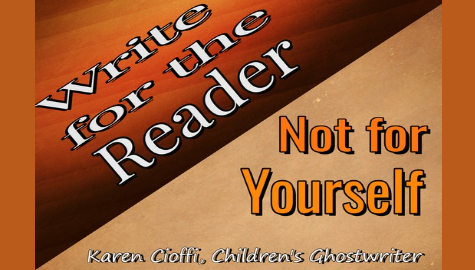Years ago, a client told me that I don’t write for the client; I don’t even write for myself; I write for the reader.
This remark was in regard to a picture book I wrote for the client and it’s the best compliment I’ve ever gotten.
This is how every author should write: for the reader.
Two key points when writing for children are writing for the reader and taking professional advice.
At this point in my writing career, I’ve probably written around 450 stories between ghostwriting, rewriting, and editing. Most of them are ghostwritten.
That’s a lot of clients. And even though I’ve had a number of series clients and return clients, I’ve dealt with at least 400 individual clients.
And I’m most likely underestimating this.
My point is that most authors, especially new authors or wannabe authors, don’t realize the importance of writing for the reader.
So, what exactly does this mean?
A perfect example of this is a young adult story I worked on last year. It was over 100,000 words, engrossing, but was also very complicated.
I worked with the client for nine months or so, and a recurring problem was that he wrote for himself.
He knew what every character’s backstory was – every little detail.
He knew the story’s backstory.
He knew the history of the story topic intimately.
He knew why Character Z was evil.
He knew how the enemy was getting their information.
He knew how the following two books in the trilogy would pan out.
The problem…
The reader wouldn’t know. The client had no interest in make the reader privy to what he knew. And the client more than occasionally would throw in something else that the reader would get lost on.
The client just couldn’t grasp that the reader cannot read his mind.
It’s easy to fall into this hole.
It’s super easy to get caught in this scenario, especially if it’s a long story and you’re writing independently.
Again, you know what you intend. You know what’s happening – you know the why to what’s happening. But this doesn’t mean the reader will, unless you clue them in.
To give a more straightforward example, suppose a story has four brothers battling an enemy, but it’s mentioned somewhere that there are five brothers. The fifth brother is briefly mentioned in a scene, then just disappears.
The author knows who the fifth brother is, where he came from, and how and why he vanished.
The author thinks it’s important to mention the fifth brother because that brother will play a big part in another book.
The problem, again, is that the reader wouldn’t know any of this.
The reader would wonder. Who’s the fifth brother? Why was he there and then vanished? What is his place in the story? She’ll possibly get annoyed that the author even mentioned the fifth brother.
You don’t want the reader to feel she’s left out of the loop or that the story is too complicated for her. Give the reader what she needs to be engaged in the story and on top of it.
Another more recent example of an author dismissing writing for the reader is a picture book I’m working on. I rewrote the story and am in the process of publishing it. I’m currently working with the illustrator, reviewing the initial sketches.
The problem arose when the author, as an inside family joke, decided to have the illustrator put a pair of big glasses on one of the secondary characters in only one scene.
I explained that this shouldn’t be done because the reader will be lost.
The questions would buzz around the young reader’s head: Why does the character suddenly have on glasses and then doesn’t again? Why is there no mention of why the glasses are there? Is there any significance to the glasses?
At the very least, the reader will be thrown out of the flow of the story. This is never a good thing.
LOL Writing this, I’m not even sure if I’m being clear enough. I know what I’m trying to say; I hope it translates over.
Readers are savvy and can read between the lines as long as the author provides enough clues or information.
Write with clarity. Don’t expect the reader to be a mind reader.
Finally, if you’re working with a professional editor, rewriter, or ghostwriter, take her advice, especially when it’s on something that just makes sense.

I’m a working children’s ghostwriter, rewriter, and coach. I can help turn your story into a book you’ll be proud to be the author of, one that’s publishable and marketable.
OTHER HELP I OFFER:
FICTION WRITING FOR CHILDREN COURSE
A guided self-study course and mentoring program.
HOW TO WRITE A CHILDREN’S FICTION BOOK
A DIY book to help you write your own children’s book.
WRITERS ON THE MOVE SELF-PUBLISHING SERVICE.
Self-publishing help for children’s authors.
You can contact me at: kcioffiventrice@gmail.com.
MORE TO READ
7 Steps to Writing Success Through Positive Thinking
Writing Elements – Is One More Important Than Another?
Submitting Your Ghostwritten Book to a Children’s Publisher


3 thoughts on “Write for the Reader, Not for Yourself”